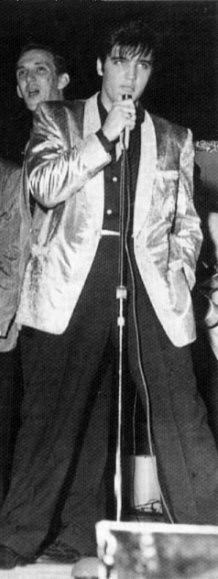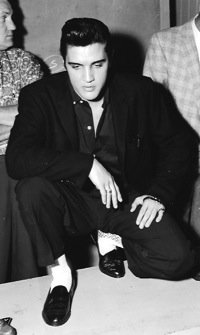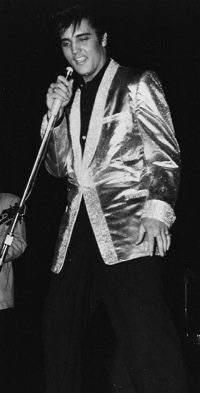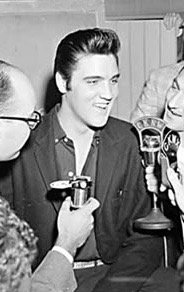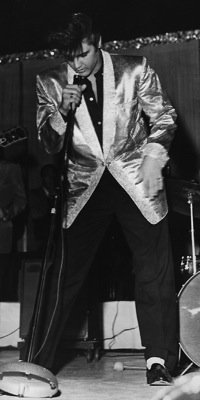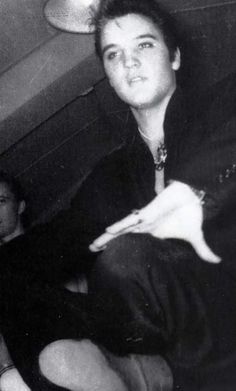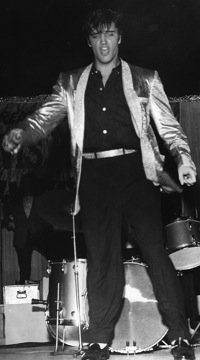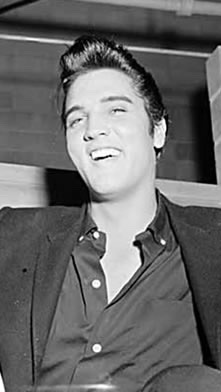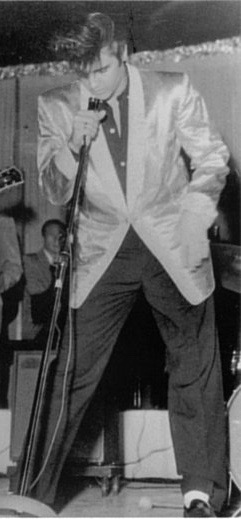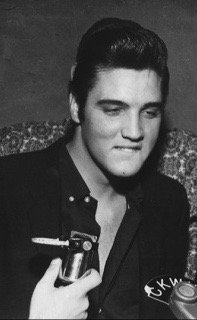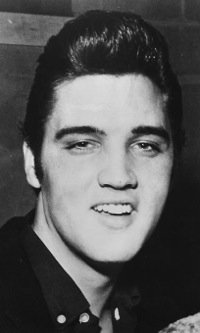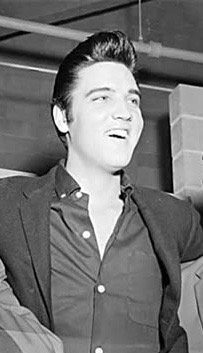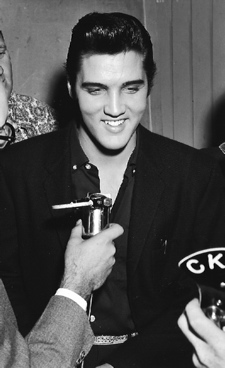Elvis History Blog
DJ Red Robinson Shared Memories
Of Elvis' 1957 Vancouver, B.C. Show
In 1957 the radio disc jockey most in tune with teen music trends in Vancouver, B.C., was 20-year-old Red Robinson. He presided over British Columbia radio’s transition to rock ’n’ roll in 1957 from his seat at CKWX, Western Canada’s first 50,000-watt radio station, which could be heard all the way to northern California. Red had been right in the middle of things when Bill Haley and the Comets, Fats Domino, and Little Richard came to town, and when he heard Elvis Presley was booked into Vancouver’s Empire Stadium on August 31, 1957, he made plans to be right in the middle of that spectacle as well.
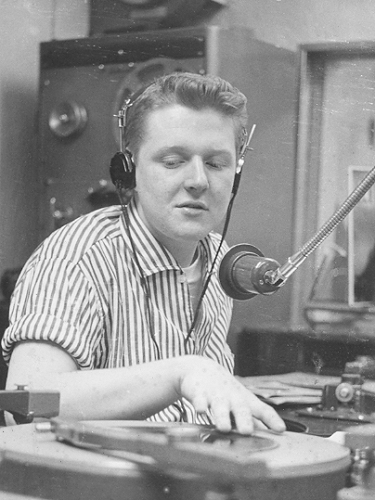
Red’s complete and crystal clear recording of Elvis’ press conference prior to his Vancouver concert is one the finest pieces of Presley media documentation from the 1950s. The DJ later spent time one-on-one with Elvis and introduced him on stage that evening.
In September 2005, I drove to Vancouver to gather information for my book, “Elvis ’57: The Final Fifties Tours.” While I was in town, Red Robinson invited me to his office to conduct an interview. While some of Red’s comments that day appeared in my book when it was published two years later, much more of it has remained buried in my files—until now. Below is the complete interview I conducted with Red Robinson on September 28, 2005.
Alan Hanson (AH): Where, exactly, did Elvis get off the train?
Red Robinson (RR): Down on Main Street. The old station is still there. Back further, about half a football field back. They stopped the train there before they brought it to the terminal. He signed some pictures that some of the fans had. How did those kids get there? Not a lot of them, maybe three or four. Some people, police or train people, knew that he was getting off there. That’s why a few people knew.
AH: In your book “Rockbound,” you refer to a girl who entered his hotel room in Vancouver. You called her a “paid escort.” Was that just an impression?
RR: The truth is—I mean, I wrote that in ’84—she was a call girl, and she went with him to Seattle, too. Why do I know this? Because of the guys who booked those shows. One was Zollie Volchuk of Northwest Releasing and his rep here, Hugh Pickett, who had a company called Famous Artists. Hugh remembers this vividly. Parker didn’t want his boy getting into trouble, thinking about the Charlie Chaplin stuff and Errol Flynn stuff, I guess. My understanding was that it was a call girl, a very highly paid professional.
AH: Did you actually do the press conference recording?
RR: Yes. It was mine and it still is mine. I had a microphone and a 601 Ampex tape recorder wrapped in leather—beautiful—weighed about 60 pounds. That’s why the quality is so good. People remark on that all the time. They say, my God, it’s like he’s in the studio, but you take a look at that equipment and you’ll know why. I mean, you know what I’m talking about, reel to reel. The quality was just fantastic. No speed variation, nothing.
AH: Did you have permission to do that or did you just do it?
RR: No, I just went. Now you’ve got gatekeepers and all that stuff, and Elvis had a few too. No, I just took it out there. Nobody seemed to mind. I did that with Buddy Holly, Louis Armstrong, everybody. I hauled the damn thing in, and people said, oh, you had foresight; what a visionary. It was just that I was a fan then, and I’m a fan now. I just wanted to preserve the encounter.
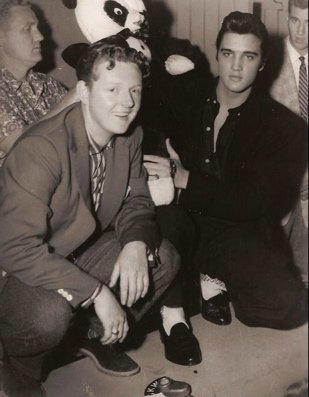
AH: Where were you during the concert, while he was up on stage?
There was a makeshift stage set up at the north end of Empire Stadium. They built the stage and put a roof over it for rain. For both The Beatles and Elvis, it was a hot summer night, so they didn’t need it. It was where the goal posts were. They removed them. At the side of the stage was a little thing like a tollbooth. You came up the stage and then you walk into this and you were blinded. So it was a little area that I stood in. After I introduced him, I just stood there and watched the show from back there. I could see everything.
AH: I have a picture of Empire Stadium as it was then that I printed off the internet.
RR: (Looking at the picture) There’s the scoreboard on the south end. He came out of the dressing room on the west side, got into a Cadillac, and went around counter clockwise because they didn’t sell out that end, and then down the east side, and walked up the stairs to the stage on the north end.
AH: Am I right in supposing there was nobody sitting behind the stage?
RR: No, of course not. The place could hold 32,000 packed for a Grey Cup game, which is like a Super Bowl in Canada.
AH: When the kids poured out of the stands, did they come from all around or just the south end?
RR: They came from everywhere. They didn’t just come from the end. Most of them came from furthest away, of course, to get a better look at him.
AH: I saw a picture yesterday at the library of kids sitting on the grass. Did anyone tell them it was OK to sit there?
RR: They just did it because in front of the stage were stanchions, like those used to guide in horses or cows. They were guarded by air cadets and boy scouts.
AH: What were the air cadets?
RR: Air cadets were 14 to 16 years of age. It was a program created in Britain and Canada for young people that may have a career in mind to go on to become pilots or navigators for the army, navy, and air force in this country or Britain. I was one of them at one time.
AH: It must have been scary for them being down on the field that night.
RR: Oh yes. It was scary for everyone, including Elvis and Scotty and Bill, believe me.
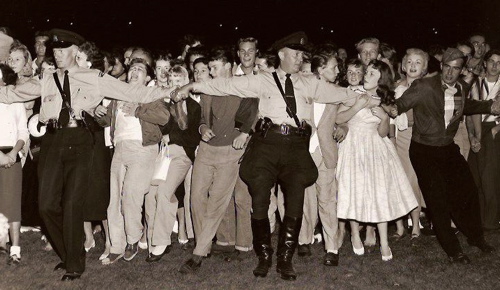
AH: When the kids came up near the stage, some accounts say that Colonel Parker came out on stage and told the kids they had to go back to their seats before the show could go on.
RR: I don’t remember that. I just remember Elvis finished a song and tore down the back stairs. In that little vestibule I was talking about, he took off his jacket and handed it to his cousin Gene, who got into the limo. The kids all followed the God damn limo, while Elvis stayed in the vestibule. I was standing right there. Colonel Parker never came out on stage.
AH: Somebody warned the kids, right?
RR: Maybe on the PA. That could be. The stadium had a big PA system up in the corner where they did the broadcasts from. Somebody could have said it from there, but no one came on stage except Elvis and myself. I’m telling you that. I don’t care where this other stuff came from.
AH: The newspaper articles talk about kids moving back and then forward, and then back and then forward several times. Does that sound familiar?
RR: No. You know what I think when that description comes up? There were policemen there, not enough of them, but I think what happened is the kids come up, take a look and go back to their seats, or go get a hot dog or whatever, so it changed all the time. I don’t think it was one major thrust like a big flood wave coming in, ever, except in the front. I’d say four or five rows never moved. You know, the ones who were standing right in front of the stage.
AH: You said it was Gene Smith who exchanged with Elvis. I read one article that said it was George Klein.
RR: It was one of guys. I thought it was Gene, but it could have been George. He was there, but I never met him. He never introduced himself, never said he was a Memphis disc jockey. The only Memphis disc jockey I knew at that time was Dewey Phillips.
AH: So you went under this trap door on the stage. How long were you there? How long did it take for the crowd to thin out?
RR: Ten minutes max. I would say more like five. People got the hell out. The show was over. Lights went out. Bang. They’re gone.
AH: Let’s talk about the crowd size. I’ve seen it estimated at everywhere from 13,000 to 26,500. The number you seem to use most of the time is 25,000.
RR: That’s right. I actually have the printout that Hugh Pickett gave me of all the sales, how much Elvis was paid, everything. I’ve got the whole document from Famous Artists, and it’s a whiz to look at that stuff. It even shows how much they paid the side musicians. It’s all there. And it says twenty-five something tickets were sold.
AH: Was there a riot? You see that word connected with this show a lot.
RR: There was pandemonium. How can I put this? You know, it’s so funny. You say you’re a historian; you’ll understand exactly what I’m saying. In retrospect, things change, become embellished. People who weren’t there write stories or they grab at something they saw in the newspaper. What is a riot? To me a riot means everything’s under control. The people are under control. Out come the water hoses; out come the guns. None of that occurred. It was troublesome pandemonium, which is something different. It was was all so new. Probably the impact of it was really a year and a half old. Bill Haley came here with the first rock ’n’ roll concert in this town in ’56, and it was wild pandemonium, euphoric—but a riot? No. When you crowd that many people together—you see it in soccer games in Europe—people die because they can’t breathe. The gathering in front of the stage for Elvis, the first five or six people deep, was where the problem was; that was where the fear was. That’s why if you read the book where DJ Fontana says he thought they were going to be killed, that’s what he means. The rest of the people were well behaved.
AH: Is “riot” a term people use if they want to paint an event in a certain way?
RR: Yeah. You have to remember that the adult world absolutely hated this. One newspaper even sent their symphony critic to cover Elvis.
AH: I think that some real zealous Elvis fans like to think he could create a riot by just showing up.
RR: There’s no question that the enthusiasm level was the highest since Sinatra went to the Brooklyn Paramount. But a riot? No. They call it a riot. I don’t.
AH: These photographs—who took them?
RR: I hired a man named Rollie Ford, who was a wonderful photographer. I paid for my own photographer to go with me everywhere I went. So that’s why I have all these. They’re all mine. This is sad. When Rollie died, his son burned all his negatives. I said to him, why did you do that? He said, “They were just taking up space in the house, and mom told me to get rid of them.” You see, he hadn’t had the experience.
AH: In other interviews, you’ve mentioned “race records,” R&B records that were sold from under the counter prior to Elvis’s time, and how his success helped bring black R&B singers into the mainstream. But when I look at photos of the crowds for Elvis in 1957, both here in Vancouver and elsewhere, I don’t see any black faces. Were there black people back then who liked Elvis?
RR: Well, it’s a difficult thing to ask me here in Vancouver. The total population of blacks in British Columbia in 1957 was 9,000. This was a vanilla country, and that’s the God’s truth. And there was a hell of a lot of bigotry here, too, which a lot of smug Canadians won’t tell you about—and I know you’ve got your tape recorder on, but I don’t give a damn anymore. Who can hurt me? But I took a lot of abuse too, so I can imagine what he went through.
AH: You might remember that in 1957 Elvis was accused of saying something like, “The only thing that Negroes can do for me is buy my records and shine my shoes.” Elvis denied it, and after interviewing Elvis and others, a reporter from Jet magazine concluded that Elvis never said it. So racism was a subject he had to deal with back then.
RR: The idea that Elvis was a racist is bullshit, and I’ll tell you why. You take a look at the clothes he bought. He loved the black music. Take a look at the things that are only being publicized now, of how he’d be driving down the street and see a destitute black woman with a little child. He went and bought her a Cadillac. Now if this guy hated blacks, he wouldn’t go near them. There’s a lot of twisted bullshit about that. I can’t believe it, because in my conversation with him backstage, we talked about a guy named Roy Hamilton. He was one of Elvis’s favorite singers and one of mine. You know, you have to understand we were kids. He was 22 and I was 20 at the time. When Elvis played Las Vegas in 1956, on his free time he’d go over and see Jackie Wilson. He’d go over and see all the black acts. He’d go see Frankie Lyman. He was raving about Clyde McPhatter. He tells me in person. No, I think that’s a crock. I don’t know whose trying to do a number on him there, but that’s bullshit.
In addition to interviewing Red, I spoke with others who were at Elvis’ Vancouver show in 1957 and consulted several contemporary newspaper accounts of the event. Conflicting descriptions of such things as crowd size, movement of teenagers on the field, Colonel Parker's role, and Elvis’ actions upon leaving the stage made my book’s chapter on the Vancouver concert the most difficult one to write. I learned that various people who saw the exact same things 50 years ago could remember them quite differently. — Alan Hanson | © July 2017
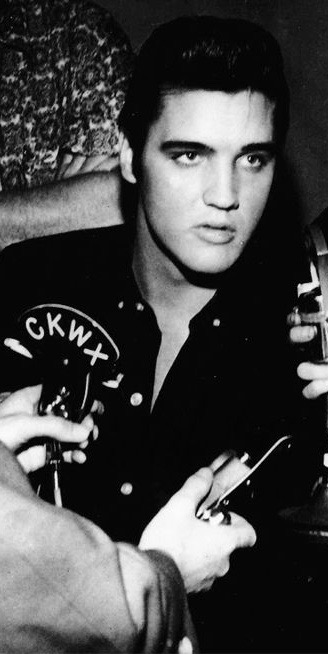
"The gathering in front of the stage for Elvis, the first five or six people deep, was where the problem was; that was where the fear was. That’s why if you read the book where DJ Fontana says he thought they were going to be killed, that’s what he means."
